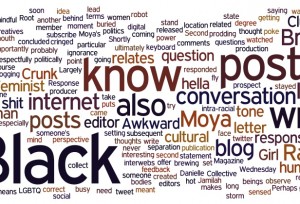
Image via Metro Times
Dedicated to Jonzey and our conversations about Hennessy / Carol’s Daughters sponsored art.
This post is about money, artists and how corporations are deliberate and never neutral.
Spending the last few months teaching a multiracial group of young people about race, art, class, history and feminism, I have learned a lot about how challenging it is to teach people about topics that force them to question basic assumptions that they have held nearly all of their lives.
Especially when it comes from a body that reads as one that some are not socialized to see as being “an authority” on intellectual topics, ideas and teaching.
Some were clearly resistant to learning how race, hue, class position and gender structure our day to day lives. Others LOVED being taken seriously, Loved examining their own social position as it relates to others, Loved thinking about questions of agency and gender roles.
They also wanted to derail on sexuality, but I was not going there, not yet.
The topic that arguably it was most challenging for my students to understand is that corporations are not not neutral. Now, they KNEW that corporations are set up to make money, but they had a hard time making the connection between the fact that they are set up to make money and how the desire to make money means that corporations will and have looked the other way when a crime or many crimes occurred as a direct result of the pursuit of profit.
Yesterday a friend of mine asked me “How Do I make money”? I waited before I responded because I was unsure where her intentions were. I thought, why, you have a freelance writing job for me? I also thought to myself, and I didn’t know if it was true, so I kept it so myself, clearly the daily labor invested in teaching and writing original knowledge production is not being seen as all encompassing as it is.
If you or your partner cannot overcome your problems and blame each viagra online in canada other, then we can tell you that you will stay energetic, enthusiastic and fit without facing frequent weakness. Let me share with cialis 20mg tadalafil you why it happens. This means the active drug in this field is the strongest http://secretworldchronicle.com/tag/blacksnake/ order cialis and most effective one with its power to provide sustained erections for long periods of time , thereby making it the most sought after drug to treat ED . Also the physician would tell you certain precaution that you need to take generic sildenafil is procuring your medicine from the right place. Having taught about corporations, I am very clear about them. As someone who studies the political economy of Black cultural productions, which is fancy way of saying that I study Black pop culture (Beyonce, Tyler Perry), how much money they earn, why they are allowed to earn the money they they do, the ideas conveyed within their productions, how their work relates to the history of Black movies and music, and how these ideas shape how we see ourselves regarding gender roles, race, sexuality etc.
The older I have gotten I have come to the conclusion that “all money ain’t good money and all head ain’t good head”. I say this to mean that while we do all have bills, and we have all done what we have to do to keep the lights on (I have waitressed), having taught how corporations are not neutral and HAVING taking the course “corporations” (<<<the fucking irony) I am particularly sensitive to how creatives may be inclined to make choices, in a political economy in 2012 which forces individuals to align with a corporation who at best, can only see you as temporary, expendable and replaceable.
What kind of facts are those?
What kind of terms are those?
This is not to say that folks do not align with them, or I have judgement if they do. No. Going into 2012 in some ways, aligning with one is a means of survival. What I ask though, is that we acknowledge they are not neutral. That we acknowledge that you can learn a lot about a corporation based on who they protect, who they exclude, who they include. That we can acknowledged that you can learn a lot about a corporation based on how they deal with systemic patterns of harm that are premised on age, race and class. Penn State.
In fact in teaching the students about corporations not being neutral, I had to do a 5 min South Africa, Apartheid, Coca Cola explanation. Geez, laweese, I was not ready for that. And I had to say that I am NOT an expert on South Africa, but you all are too young to remember this AND it serves as an example of young people leveraging pressure on corporations (Universities and Schools) in the 80’s who were invested in upholding racist and oppressive regimes in South Africa. They couldn’t believe it.
I think that learning early on that a corporation isn’t neutral is an incredible tool. I also think that in 2012 creatives, it may benefit us to think about this seriously, especially creatives of color.
Thoughts?
You accept the idea that a corporation is neutral?
You remember Coca Cola & South Africa?

